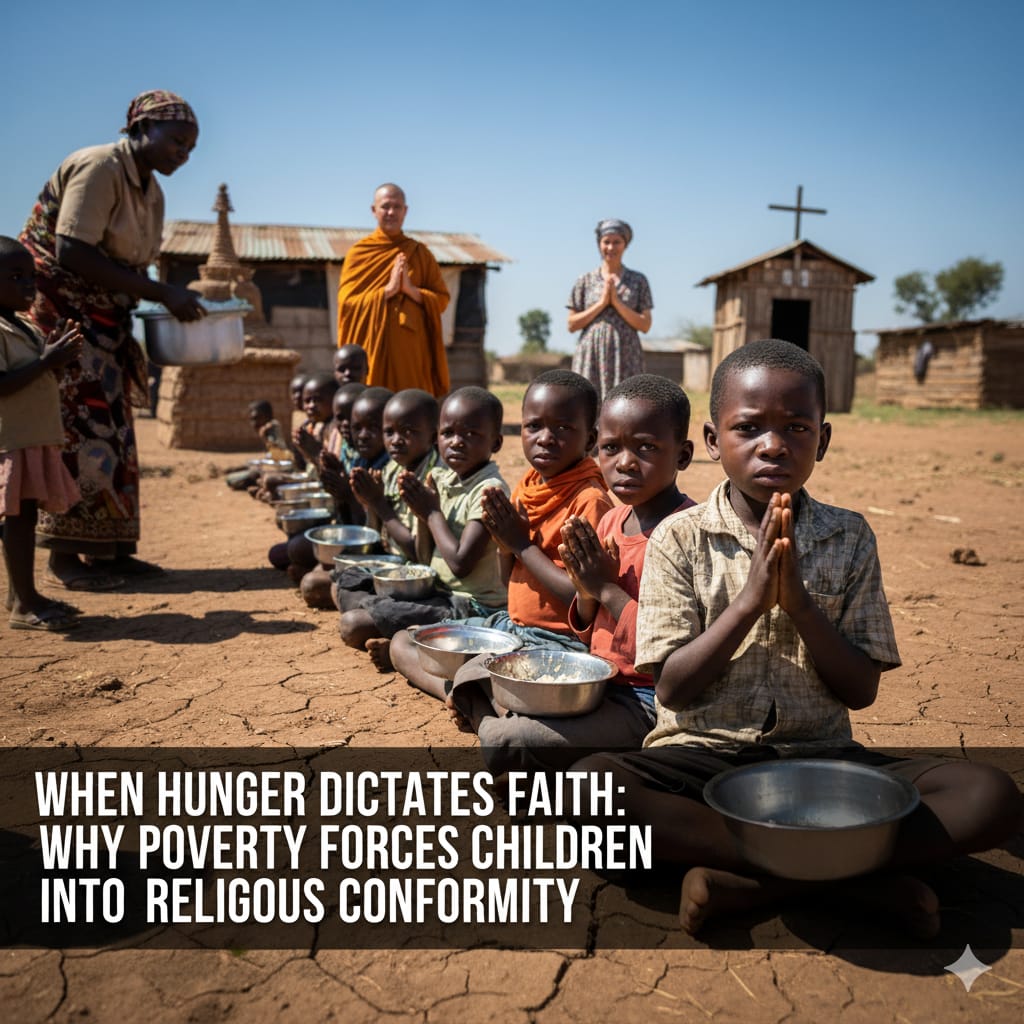By Jermaine Magethe
This week, a video from Ganze, Kilifi shocked the country. It showed children in line for food, reciting Hindu prayers before they were allowed to eat. The government was quick to stop the feeding program involved.
But hey, if we just pause and look deeper, what’s the real problem here? Is poverty always the enemy? It was never just about one religion or one county. It is about how poverty forces children to take part in religious practices they may not believe in, simply to survive.
A hungry child has little freedom. Because you know what? What is a little prayer for a hot plate of food? What may look like worship is really survival.
And this happens across different faiths.
In some cases, the state itself has warned that schools are violating learners’ religious rights; the Ministry of Education issued guidance about the violation of religious rights in schools after complaints about forced religious practices. In Northern Kenya, where drought and food insecurity are common, families tell similar stories: scholarships or food support provided by some charities can come with the expectation of attending religious lessons. And now in Ganze, Hindu prayers became part of the routine before meals.
This is not faith freely chosen. It is poverty taking away a child’s right to choose.
The scale of vulnerability is immense. The World Food Programme works with the Government of Kenya to provide school meals to roughly 1.6 million children and in drought-hit counties a school meal may be the only food a child receives all day. That dependence makes children highly vulnerable to any conditions attached to aid.
Kenya has signed the UN Convention on the Rights of the Child . It says every child has:
- The right to freedom of religion (Article 14).
- The right to education without discrimination (Article 28).
- The right to protection from exploitation (Article 36).
When aid is tied to religious practices, these rights are violated. Poverty is being used as a tool to control children’s beliefs.
This is not only a Kenyan problem. Research on faith-inspired education shows that where faith-based providers deliver large shares of schooling, the line between service and religious instruction can blur on faith-inspired schools. Elsewhere, reporting and analysis have documented cases where aid or stipends were linked to religious study for background on madrasas and aid in regional contexts. Around the world, whenever children depend on aid to survive, the risk of forced conformity grows.
Kenya launched a National School Meals and Nutrition Strategy (2017–2022) with the goal of universal coverage. But implementation has been slow and uneven. As a result, large gaps remain, especially in arid and semi-arid counties, gaps often filled by faith-based organizations. While many operate with integrity, the lack of clear regulation and monitoring leaves children unprotected when aid crosses into coercion.
Faith-based groups have long filled gaps the state has left open. Their compassion is genuine, their reach vital. But when meals or education are tied to worship, charity risks turning into quiet coercion. This is the paradox: the same institutions that provide lifesaving support can also undermine children’s dignity if safeguards are not in place.
The most concerning thing about this issue is not religion or aid, but the child. Imagine being eight years old, stomach empty since the night before, and being told you must bow your head and pray in a faith you do not know just to eat. That moment does not build belief, it teaches fear, dependence and silence. Children deserve better.
The Ganze story has exposed what many already know: children in poor communities are often asked to trade their beliefs for food. It’s not about Hinduism, Christianity, or Islam but about poverty creating pressure that no child should face.
If We truly value children’s rights, no child should have to choose between a meal and their faith. Until then, hunger will continue to silence their freedom not as an act of reverence, but as a struggle to survive.
As we believe, every child deserves dignity, choice and protection. We call on policymakers to strengthen national school feeding programs, enforce safeguards against coercive aid and ensure that no child is forced to worship for a plate of food. Hunger should never dictate faith.

